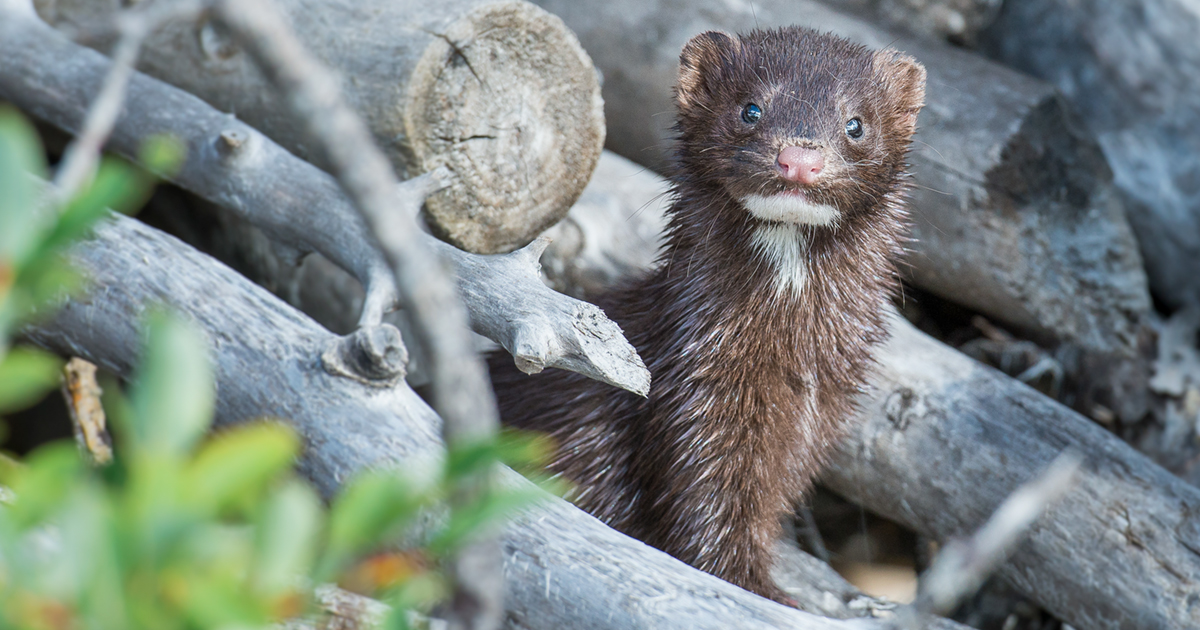
The following news release was issued by the Union of B.C. Indian Chiefs on April 6, 2021. We have reposted the news release in its entirety below.
((Xʷməθkʷəy̓əm (Musqueam), Sḵwx̱wú7mesh (Squamish) and səlilwətaɬ (Tsleil-Waututh)/Vancouver, B.C. – April 6, 2021) The Union of BC Indian Chiefs (UBCIC) joins the BC SPCA and other advocates calling for a moratorium on mink farming in the province.
Over the course of the pandemic, COVID-19 has spread rampantly at mink farms in Europe and North America, most notably resulting in Denmark’s drastic decision to cull all 15 million minks bred at its 1,139 mink farms. While other nations begin to accelerate plans to phase out and ban fur farms, the B.C government recently announced the resumption of mink breeding at BC mink farms, including at one farm that is still under quarantine. Last December, two hundred mink died and another 1,000 were euthanized as a precaution after mink at two Fraser Valley farms tested positive for the coronavirus.
“It may be surprising to many that British Columbia has a fur farm industry which revolves around the mass breeding and slaughtering of wild animals for luxury fashion items and has been widely regarded as unethical and unnecessary,” stated Grand Chief Stewart Philip, UBCIC President. “UBCIC supports the ethical harvesting of fur for cultural and ceremonial purposes, and for purposes that align with Indigenous ways and respect values of conservation and stewardship. However, UBCIC does not condone the industrial breeding, confinement and slaughtering of minks for international luxury markets especially as, notwithstanding the current public health risks, mink farms have long been implicated in cruel and inhumane fur farming practices that have led to unacceptable animal welfare outcomes. Evidence exists on both local and international scales regarding the unnecessary and deeply troubling suffering minks are subjected to – lifelong confinement in cramped and filthy cages which, during a pandemic, only promotes the spread of COVID-19 and other respiratory viral infections.”
Chief Don Tom, UBCIC Vice-President, stated “With many countries having banned fur farming altogether, and with COVID-19 leading countries like the Netherlands and France to accelerate their phasing out of mink farms, the time is now for the Province to follow suit and issue a moratorium on mink farming, including immediately suspending breeding programs at all 13 mink farms in B.C. For years, the BC SPCA and other animal welfare organizations and advocates have pointed to the unethical issues around mink farms, as well as questioning the necessity and economic value of continuing fur farming; in 2018, over 260,000 mink were killed for fur in B.C., despite 85% of British Columbians opposing such a practice. UBCIC calls upon the Province to consider the long-term viability and impacts of industrial fur farming.”
“It is deeply alarming that as the global community seems to be transitioning away from fur farms, particularly mink and fox farms, B.C continues on its trajectory of fur farming despite the fact that most Canadians have sworn off fur products and remain fundamentally opposed to the unacceptable harms wild animals suffer when bred and raised on fur farms,” stated Kukpi7 Judy Wilson, UBCIC Secretary-Treasurer. “It is important to remember that we treat mink not as objects at our disposal, but as living creatures that hold significant cultural value for First Nations and are animals that play an important role in our stories of Creation and systems of knowledge. UBCIC continues to support the ethical and sustainable hunting and harvesting of wild animals and advocates for their welfare and conservation. As outlined in UBCIC’s discussion paper and mandate on hunting, we recognize the hunting and harvesting of wildlife as a powerful and sacred tradition that gives shape and meaning to life lived in a Nation’s territory, and through Indigenous laws we sustainably regulate hunting, manage game, and protect wildlife species.”
UBCIC is an NGO in Special Consultative Status with the Economic and Social Council of the United Nations. For more information, please visit www.ubcic.bc.ca.
